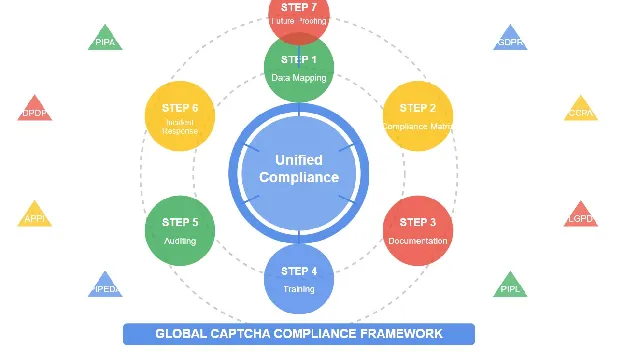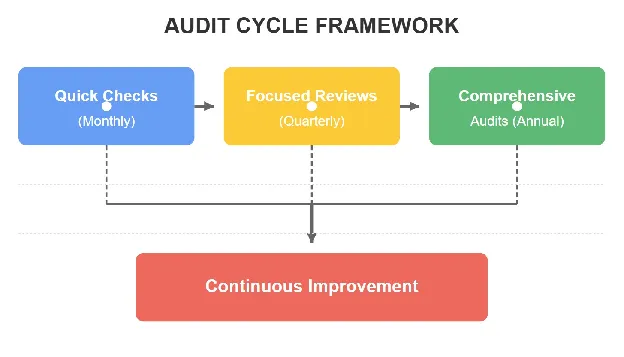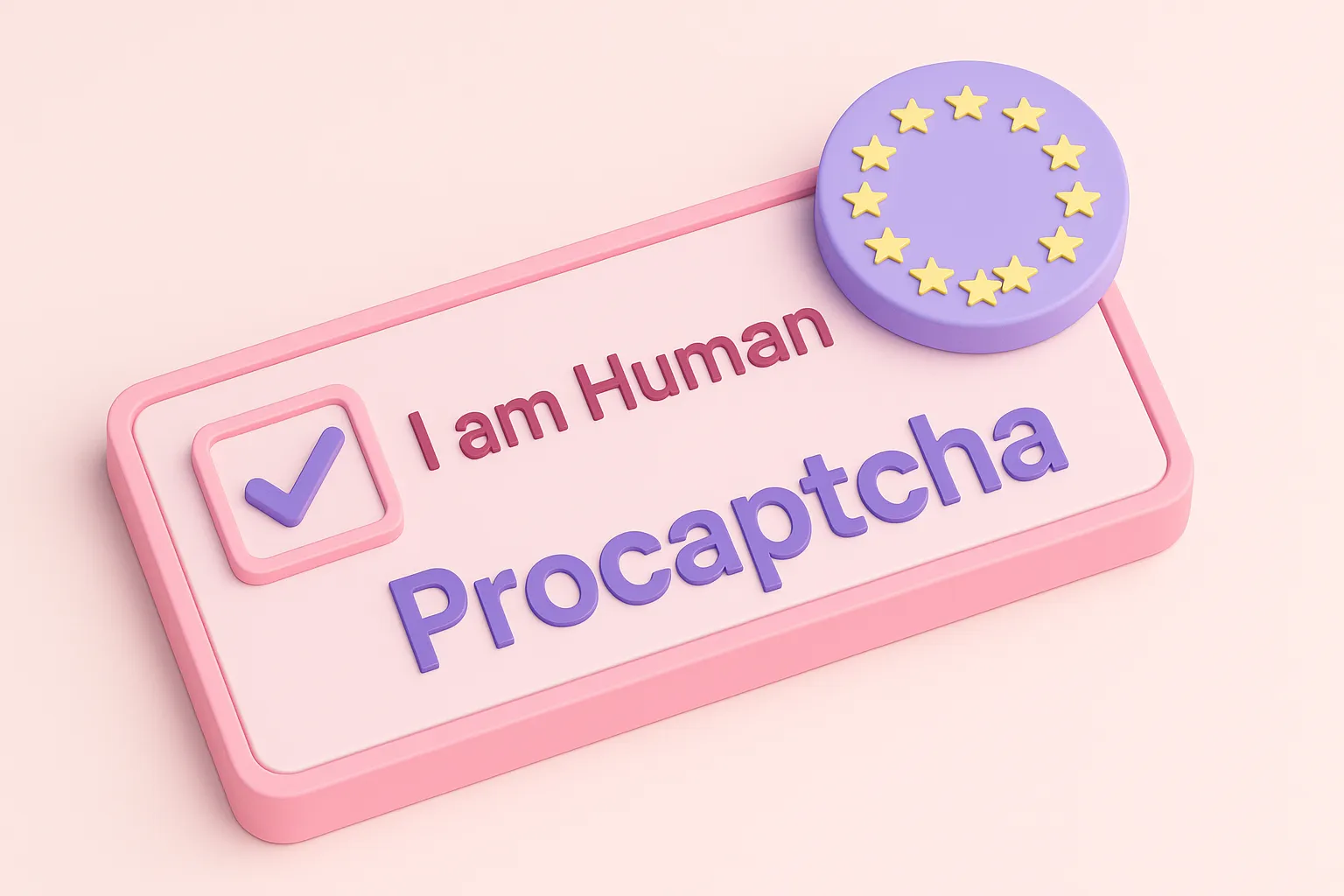What Privacy Laws Should CAPTCHA Providers Comply With
Did you know that the average internet user solves over 100 CAPTCHAs per year, unknowingly sharing behavioral data across borders? In today's digital landscape, understanding what privacy laws CAPTCHA providers should comply with isn't just regulatory bureaucracy - it's an essential business strategy.
From Europe's stringent GDPR to emerging frameworks in Asia, navigating this complex legal maze determines whether your security solution protects users or becomes your biggest liability.
In this article, we will:
- Master nine privacy laws to protect your business
- Implement a seven-step plan for global compliance
- Give quick answers to your CAPTCHA privacy questions
Safeguard Your CAPTCHA Service: 9 Global Privacy Laws You Must Implement Today
CAPTCHA systems play a crucial role in online security by differentiating between human users and bots. However, this security comes with significant privacy implications.
As a CAPTCHA provider, navigating the complex landscape of global privacy regulations is not just good practice - it's a legal necessity that could make or break your business.
1. GDPR (General Data Protection Regulation)
The European Union's GDPR represents the gold standard for privacy protection worldwide and has far-reaching implications for CAPTCHA providers handling data from EU residents.
Consent requirements for data collection
Under CAPTCHA GDPR requirements, providers must obtain clear, specific consent before collecting user data. This means:
- Consent must be freely given, specific, informed, and unambiguous
- Pre-checked boxes and passive consent methods are insufficient
- Users must be able to withdraw consent as easily as they gave it
- CAPTCHA systems that automatically collect data without explicit consent violate GDPR principles
Data minimization principles
Image: https://pixabay.com/photos/data-keyboard-mouse-big-data-4151152/
 GDPR demands that you collect only what's absolutely necessary for your CAPTCHA to function properly:
GDPR demands that you collect only what's absolutely necessary for your CAPTCHA to function properly:
- Limit data collection to what is directly relevant for bot detection purposes
- Avoid collecting excessive information "just in case" it might be useful later
- Regularly audit your data collection processes to ensure ongoing compliance
- Consider whether your CAPTCHA could function effectively with less personal data
User rights (access, erasure, portability)
CAPTCHA providers must honor fundamental user rights regarding their personal data:
- Right to access: Users can request confirmation of whether their data is being processed and receive copies of their personal data
- Right to erasure: Users can request the deletion of their personal data without undue delay
- Right to data portability: Users can request their data in a structured, commonly used format
- Right to object: Users can object to the processing of their personal data
Cross-border data transfer restrictions
GDPR imposes strict limitations on transferring data outside the European Economic Area:
- Data transfers to countries without adequate protection require specific safeguards
- Standard Contractual Clauses (SCCs) or Binding Corporate Rules may be necessary
- CAPTCHA providers must document their data transfer mechanisms
- The invalidation of Privacy Shield has complicated transfers to the United States
2. CCPA/CPRA (California Consumer Privacy Act/California Privacy Rights Act)
California's privacy regulations affect any CAPTCHA provider serving California residents and set the benchmark for U.S. privacy standards.
Notice requirements
Transparency is paramount under California's privacy framework:
- Providers must display a clear and conspicuous privacy notice at or before data collection
- The notice must detail categories of personal information collected and their purpose
- Privacy policies must be updated at least every 12 months
- CAPTCHA implementations must include or link to these notices
Opt-out rights for California residents
California residents have powerful rights regarding their personal information:
- The right to opt out of the sale or sharing of their personal information
- CAPTCHA providers must honor opt-out requests within 15 business days
- Businesses must maintain opt-out records for 24 months
- "Do Not Sell My Personal Information" links must be prominently displayed when applicable
Special considerations for businesses serving California users
The CPRA introduced additional obligations for CAPTCHA providers:
- Creation of a new category called "sensitive personal information"
- Expanded private right of action for data breaches
- Establishment of the California Privacy Protection Agency
- Enhanced requirements for contracts with third-party data processors
3. PIPEDA (Personal Information Protection and Electronic Documents Act - Canada)
Canadian privacy law operates on a consent-based framework with unique requirements for CAPTCHA providers.
Consent and transparency requirements
PIPEDA emphasizes meaningful consent and clear communication:
- Consent must be meaningful and understandable to the average person
- Information about data practices must be provided in "clear and straightforward language"
- CAPTCHA providers must document purposes for collection at or before the time of collection
- Different types of information may require different forms of consent (express vs. implied)
Limitations on data collection and use
PIPEDA imposes significant restrictions on data practices:
- Organizations can collect, use, or disclose personal information only for purposes a reasonable person would consider appropriate
- Data collection must be limited to what's necessary for identified purposes
- Personal information should be retained only as long as necessary
- CAPTCHA providers must implement policies regarding information disposal
4. LGPD (Lei Geral de Proteção de Dados - Brazil)
Brazil's comprehensive privacy law closely resembles the GDPR but contains unique elements specific to the Brazilian context.
Key compliance requirements for international providers
CAPTCHA providers serving Brazilian users must understand these critical aspects:
- The law applies to any organization processing data of individuals located in Brazil
- Data subject rights mirror those in GDPR but include the right to information about public and private entities with whom data has been shared
- Legal bases for processing must be clearly identified and documented
- Organizations must appoint a Data Protection Officer (DPO)
- Significant penalties can reach up to 2% of revenue in Brazil (capped at 50 million reais per violation)
5. Australia's Privacy Act
Australia's approach focuses on "reasonable steps" to protect personal information:
- CAPTCHA providers must implement a compliant privacy policy
- Disclosure to overseas recipients requires special consideration
- Recent amendments strengthen penalties for serious or repeated breaches
- Proposed reforms may introduce a direct right of action for individuals
6. Japan's Act on Protection of Personal Information (APPI)
Japan's framework includes unique provisions CAPTCHA providers should note:
- Requirements for obtaining consent before transferring data to third parties
- Special rules for transferring data to foreign entities
- The concept of "anonymously processed information" with reduced restrictions
- Mandatory breach notification requirements for certain incidents
7. South Korea's Personal Information Protection Act (PIPA)
South Korea maintains one of the strictest privacy regimes globally:
- Requires explicit consent for collection and use of personal information
- Imposes criminal penalties for privacy violations
- Restricts cross-border data transfers without specific consent
- Requires the appointment of a privacy officer regardless of company size
8. China's Personal Information Protection Law (PIPL)
China's relatively new privacy framework introduces stringent requirements with global implications:
Critical compliance elements for CAPTCHA providers
- Extraterritorial application affects any provider processing data of individuals in China
- Requires a clear and legitimate purpose for processing personal information
- Mandates separate consent for processing sensitive personal information
- Imposes strict data localization requirements for certain types of data
- Requires security assessments for cross-border data transfers
- Penalties can reach up to 50 million yuan or 5% of annual revenue
- Establishes a blacklist system for non-compliant overseas entities
9. India's Digital Personal Data Protection Act (DPDP)
India's emerging privacy framework introduces unique approaches CAPTCHA providers must understand:
Key features affecting CAPTCHA implementation
- Based on seven key data protection principles, including lawful processing and purpose limitation
- Introduces the concept of "deemed consent" for certain processing activities
- Requires prompt notification of data breaches to both authorities and affected users
- Imposes significant financial penalties with a tiered structure based on violation severity
- Creates a Data Protection Board of India with broad enforcement powers
- Restricts cross-border transfers to only notified countries and territories
- Provides special protections for children's data with verifiable parental consent requirements
Remember that privacy laws continue to evolve rapidly, making ongoing compliance monitoring an essential business function that directly impacts your bottom line.
Your 7-Step Blueprint for Borderless CAPTCHA Compliance Success
The fragmented landscape of international privacy regulations presents a significant challenge for CAPTCHA providers operating across multiple markets.
Forward-thinking organizations are implementing unified global compliance frameworks rather than creating separate compliance silos for each jurisdiction.

STEP 1: Map Your Data Universe
Begin with a thorough data mapping exercise to understand exactly what information your secure CAPTCHA solution collects, processes, and stores across all jurisdictions. This foundation allows you to:
- Identify your highest-risk markets and use those regulations as your compliance baseline
- Implement a "privacy by design" methodology from day one
- Develop clear accountability structures with designated privacy champions
Expert Insight: Building your compliance program around GDPR provides an excellent foundation, but don't neglect unique regional requirements that go beyond European regulations.
STEP 2: Create Your Unified Compliance Matrix
Develop a comprehensive requirements matrix that identifies common denominators across regulations while highlighting jurisdiction-specific provisions. Your matrix should answer critical questions like:
- "If we implement this CAPTCHA feature, what privacy requirements does it trigger globally?"
- "Which regions require specific documentation for this data processing activity?"
- "What is the highest common denominator for consent requirements across our markets?"
Color-code your matrix to visualize compliance responsibilities: red for crucial requirements, yellow for moderate concerns, and green for fewer compliance barriers.
STEP 3: Build Scalable Documentation Systems
Documentation is the backbone of defensible compliance. Create a system that includes:
| Documentation Type | Global Approach | Regional Adaptation |
|---|---|---|
| Privacy Policies | Core components consistent globally | Region-specific addendums |
| Data Processing Records | Comprehensive baseline format | Market-specific supplements |
| Impact Assessments | Standardized templates | Local requirement additions |
| Consent Mechanisms | Universal framework | Language and cultural adaptations |
STEP 4: Empower Through Training
Human error remains one of the biggest compliance risks. Implement:
- Role-specific privacy training for all team members
- A privacy champions program embedded throughout your organization
- Regular tabletop exercises simulating privacy incidents
- Training that addresses cultural perspectives on privacy across regions
GAMIFICATION TIP: Create simulated compliance challenges and reward teams that successfully navigate complex privacy scenarios involving CAPTCHA implementations.
STEP 5: Verify Through Global Auditing
A robust audit program verifies that your compliance strategy works in practice:

Consider reciprocal audits between regional teams to bring fresh perspectives and cross-pollinate best practices.
STEP 6: Design Global Incident Response
Despite best efforts, privacy incidents may occur. Prepare with:
- A unified incident response framework that satisfies requirements across all jurisdictions
- Clear escalation paths accounting for time zone differences and regional holidays
- Templates for different types of notices in multiple languages
- Decision trees helping teams quickly determine which regulations apply
STEP 7: Future-Proof Your Strategy
Privacy regulations continue to evolve rapidly. Stay ahead by:
- Actively monitoring regulatory developments in key markets
- Participating in industry associations and standards bodies
- Building flexibility into technical systems
- Scheduling quarterly "privacy horizon scanning" sessions
By approaching CAPTCHA privacy compliance holistically rather than as disconnected regional requirements, you position your organization for sustainable success while effectively protecting user privacy across borders.
Turn Compliance into an Advantage, Not a Burden
CAPTCHA providers can no longer afford to treat privacy compliance as an afterthought. With strict global regulations like GDPR, CCPA, and PIPL, ensuring that your CAPTCHA solution aligns with legal standards is essential to avoiding fines, building user trust, and maintaining operational security.
By minimizing data collection, ensuring transparency, and choosing privacy-first solutions, you can turn compliance into a competitive advantage rather than a liability.
Looking for a secure, privacy-compliant CAPTCHA? Explore how a Proof of Effort CAPTCHA ensures compliance while effectively blocking bots!
Related Posts to What Privacy Laws Should CAPTCHA Providers Comply With

Which Security Risks Does CAPTCHA Pose: Critical Flaws?
Tue, 25 Mar 2025

What do Artists do to Prevent Ticket Scalping?
Wed, 02 Apr 2025

What is the Future of CAPTCHA and Online Privacy
Thu, 03 Apr 2025

How to Make CAPTCHA GDPR Compliant & Protect Privacy
Tue, 08 Apr 2025

How Do Scalpers Get Tickets Before Selling Them
Wed, 09 Apr 2025

How to Integrate CAPTCHA Without Violating User Rights
Sat, 12 Apr 2025

How to Choose a GDPR-Friendly CAPTCHA for WordPress
Fri, 18 Apr 2025

How Does CAPTCHA Collect User Data? The Reality
Fri, 25 Apr 2025

🎫 Preventing Ticket Bots - The Battle for Fair Access
Sun, 02 Nov 2025

Survey Companies Are Having Their Data Compromised by AI Bots
Tue, 25 Nov 2025

